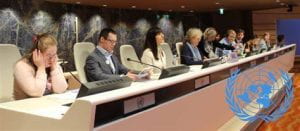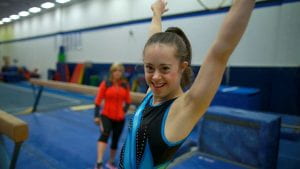March 21st marks World Down Syndrome Day (WDSD). On this day, events take place worldwide to raise awareness, promote inclusivity, encourage advocacy, and support people with Down syndrome. This day carries a lot of importance for individuals with Down syndrome as it creates a platform for their voice, which is often unheard of. This year’s WDSD focuses on campaigning for the right to legal capacity, with the slogan “With Us Not for Us.” Every year the United Nations holds a conference for WDSD, which will be hosted in New York this year. The goal for each meeting is to identify and speak on key issues that affect people with Down syndrome, call for action, and inclusive policymaking. Since 2011, the UN General Assembly (UNGA) has designated this day to raise awareness about the struggles and successes of individuals with Down syndrome.

History of WDSD
At every WDSD conference, individuals with Down syndrome and other disabilities, activists, and UN and government officials consider different ways to help the Down syndrome community. WDSD gives power and a voice to people with Down syndrome, enabling them to speak on the changes they want and providing guidance to how we collectively, as a global community, can help. Past themes of WDSD have supported inclusion, acceptance, and freedom for all individuals with disabilities. All too often, individuals with any form of disability are deemed unfit or incapable of being independent due to a lack of awareness and understanding, which is why this day is immensely important. Down Syndrome affects 3,000-5,000 newborns every year, which is caused when newborns have an extra copy of chromosome 21. Their struggles begin from the moment they are born. People with Down syndrome are not always accepted, particularly in societies that have strong stigmas against medical problems.
Legal capacity
Every year, the WDSD conferences promote different aspects that individuals with Down Syndrome face, this year’s WDSD conference focused on the right to legal capacity and decision-making. People with Down syndrome are often not given the right to make their own life decisions. The United Nations Convention on the Rights of Persons with Disabilities (UNCRPD) protects this right, but the sad reality is that it is often ignored. Legal capacity is critical for people with Down syndrome, as without it, they have no authority to make decisions on:
- The right to choose where and who they live with.
- The right to make decisions on their healthcare.
- The right to get married and have a family.
- The right to control their own money and property.
This is a prevalent issue. Rather than having protection from governments or their families, people with Down syndrome are often considered mentally incompetent and incapable of making their own decisions. Governments and judicial areas within countries are responsible for ensuring that people with Down syndrome have the right to legal capacity and the proper protection and support.

Struggles
All over the world, people with Down Syndrome are treated unjustly. They are denied proper education, healthcare, and employment opportunities and are often ignored, unable to make decisions about their lives. These struggles are pervasive, affecting developing countries and modern, progressive westernized countries. In 2019, Bassel Dib, a man with Down syndrome, was dismissed from an internationally recognized gym chain, Golds Gym, in Amman, Jordan. He was kicked because the owner did not want someone with a visible disability to ruin the gym’s prestige. The owner is a well-known member of the Jordanian parliament who has been able to get away with discrimination on multiple occasions by leveraging his status and powerful connections within the Jordanian government. Common stigmas and stereotypes surrounding people with Down syndrome prevent them from accessing specific opportunities, places, and decision-making power.
Successes
Despite these injustices, there are many inspiring success stories of people with Down syndrome. For instance, Bassel has been able to go to college, compete in the Special Olympics on the Jordanian national team, and now aspires to become a bodybuilder. Sofia Jirau made history as Victoria’s Secret’s first model with Down syndrome. Chelsea Werner, a special Olympic gymnast that has now become a successful model, was a four-time U.S. national championship winner in gymnastics and has modeled on the cover of Vogue and New York Fashion Week. John Tucker, also a man with Down syndrome, starred in the Emmy-winning series “Born This Way.” This series features seven young people with Down syndrome and follows their lives as they look for employment and housing while overcoming societal obstacles. These are just a few success stories of people with Down syndrome. Numerous other achievements exist, from small unknown advancements to big, publicized ones. The important thing is that every single one of them has been able to break societal barriers and achieve their dreams.

What can you do
The most significant problem for people with Down syndrome is the lack of equal opportunities. We can work towards addressing this issue by educating ourselves, our peers, friends, and families. It is crucial to constantly be aware of issues preventing people with Down syndrome from accessing their full independence and power. Together, we can collectively create positive change and ensure that people with Down syndrome are given the same attention, opportunities, and power as everyone else.
Additional information
Sign up here for news and World Down Syndrome Day Team information.
Down Syndrome International has created a downloadable guide explaining what Down syndrome is and key topics surrounding people with Down syndrome.

